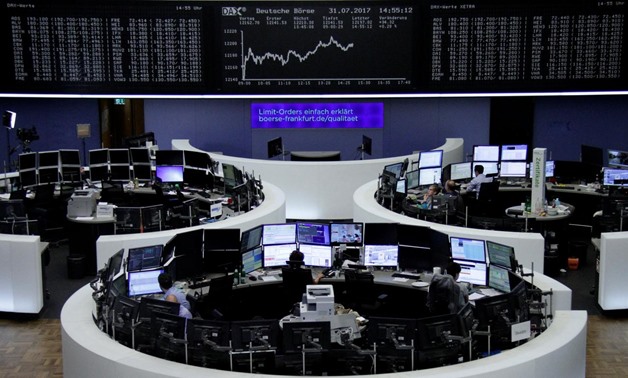
Traders work in front of the German share price index, DAX board, at the stock exchange in Frankfurt, Germany, July 31, 2017.
Staff/Remote
LONDON - 3 August 2017: Upbeat economic news helped push European stock markets higher on Thursday, while sterling hit a nine-month low against the euro after investors concluded the Bank of England was in no hurry to raise interest rates.
Equities recovered from early falls to nudge into positive territory, with markets in Italy and France 0.4 percent higher although German stocks dipped.
Britain's blue-chip FTSE climbed 0.6 percent to a one-week high, while sterling skidded to a nine-month low at 90.13 pence per euro and pulled back from an 11-month high against the dollar after the BoE left rates at a record low.
BoE Governor Mark Carney and his top officials reiterated their message that they might raise borrowing costs by slightly more than investors expect over the next three years, possibly within a year. But markets focused on the Bank's downward revision of its 2017 growth forecasts.
"The 6-2 vote (on rates) was as expected. However the dovish growth and inflation (forecasts were) a surprise to the markets," said Mizuho's head of hedge fund FX sales, Neil Jones.
Upbeat economic and earnings news were broadly supportive of sentiment in European equity markets, analysts said.
Data on Thursday showed Italy's service sector posted its fastest growth for a decade in July, boosting prospects for the euro zone's third-largest economy.
Retail sales in the euro zone increased by 0.5 percent in June on the month, well above market expectations of a 0.1 percent rise.
Shares in Unicredit climbed almost 5 percent after Italy's largest bank reported forecast-beating profits for the second quarter, while British retailer Next jumped 9 percent after returning to sales growth in its latest quarter.
In a further sign that Europe's economy and the outlook for monetary policy has turned a corner, the Czech central bank raised its main interest rate - becoming the first central bank in the European Union to embark on a new tightening cycle in more than five years.
Its decision to deliver its first rate hike since 2008 lifted the Czech crown.
"There is definitely a change of trend in interest rates," said TD Securities head of emerging markets strategy Cristian Maggio.
"I think the Czechs are more in need of normalizing rates because they have held them so low for such a long time... The ECB will be the last one to move in the region, but the market will be anticipating it."
Wall Street Seen Flat
Trade in U.S. stock market futures pointed to a flat open on Wall Street -- a day after the Dow Jones Industrial Average broke the 22,000 barrier for the first time in its 121-year history.
As the impact of the move faded, investors booked profits -- pushing Asian shares down and initially sending European stocks lower too.
MSCI's broadest index of Asia-Pacific shares outside Japan fell 0.7 percent and South Korea's tech-heavy Kospi index slumped 1.7 percent to its lowest level in over three weeks. Seoul shares took an additional hit from President Moon Jae-in's new tax plan.
Japan's blue-chip Nikkei stock index closed down 0.3 percent.
"After some symbolic moves in U.S. markets, we have taken a break but some European markets like Italy are doing really well thanks to a plethora of good news," said Kathleen Brooks, research director at City Index.
The dollar inched away from a 15-month low versus a basket of six currencies, but was still looking wobbly due to doubts about whether there will be another U.S. interest rate rise this year.
U.S. inflation has been contained even as the labor market appears to be in its best shape in many years, with the jobless rate staying near a 17-year low.
Friday's closely watched government employment report could provide more clues on the economic outlook.
The dollar index rose about 0.2 percent to 92.989. On Wednesday, it slid to 92.548, its weakest level since May 2016.
The euro was a touch weaker at $1.1845, after rising to around $1.1911 on Wednesday, its highest level since January 2015.

Comments
Leave a Comment